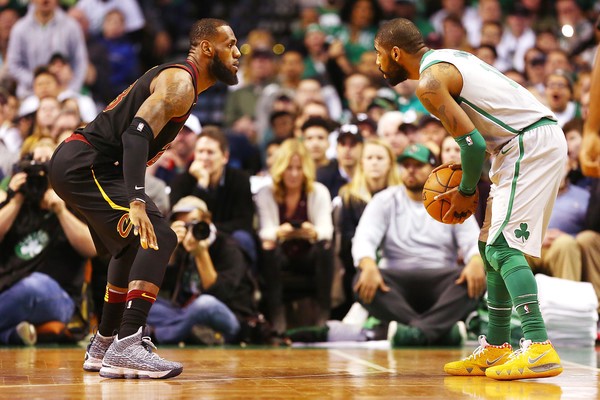
Almost six months has passed since the Cleveland Cavaliers shipped Kyrie Irving to the Boston Celtics after he requested a trade. And yet, even after all that time, details contextualizing his departure continue to trickle out.
The latest has him getting word of a draft-night discussion about his future in Cleveland among the Cavaliers front office that ultimately rubbed him the wrong way, according to ESPN.com’s Dave McMenamin:
The discussion, characterized as “small talk” by one source familiar with its content, was less a formal straw poll of what the Cavs should do with their All-Star point guard should trade opportunities present themselves, and more of a thought exercise anticipating what the market could bear for a player of Irving’s caliber.
The talk got back to Irving, multiple team sources told ESPN, and that served as the tipping point that led to Irving formally requesting a trade a little more than two weeks later.
“It was sloppy,” one league source familiar with the draft-day discussion told ESPN, adding that any talk about trading a player of Irving’s ilk — however informal it might be — should be handled strictly between the GM and owner, because of the sensitive nature of its content. Once a player feels expendable or undervalued from his own team, getting him to buy back in is a prickly proposition.
The discussion in question took place “just days” after the Cavaliers parted ways with general manager David Griffin, further proving how important he was to maintaining team order.
Yes, these types of talks happen all the time. But conversations so hypothetical shouldn’t be getting back to the players—especially when you’re talking about a top-25 star. They’re not typically made available in trade talks unless teams are pivoting into a rebuild. The Cavaliers, in this case, would have been dangling Irving in order to beef up the supporting cast around LeBron James, which is substantially different territory.
Whatever their objective, they needed to keep these talks closer to the vest. And when things went sideways, it would have behooved them to realize that they didn’t need to grant Irving’s request. He doesn’t hit free agency until 2019 (player option). He didn’t have the leverage to force their hand.
Hindsight is 20/20 and all that stuff. But a lot of what went wrong for Cleveland behind the scenes is common sense and proper business decorum—something the team clearly lacked in the immediate days and weeks following Griffin’s exits.




















